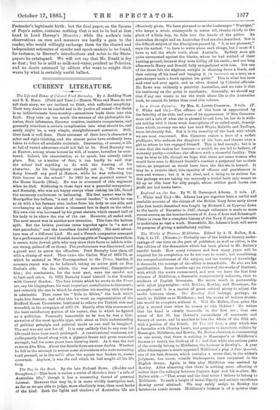CURRENT LITERATURE.
The Life and Times of Colonel Fred Burnaby. By J. Redding Ware and R. K. Mann. (Field and Tear.) —Messrs. Ware and Mann do not tell their story, we are inclined to think, with sufficient simplicity. Their very desire to be candid and to do justice all round—for theirs is no indiscriminate hero-worship—sometimes leads them into this fault. They take up too much the manner of the philosophic his- torian, draw inferences, discover motives, institute comparisons, and generally introduce a certain complication into what should be, and easily might be, a very simple, straightforward narrative. Still, their book is well done. Their estimate of their hero's character is .sober and right-thinking, and the utmost pains have evidently been taken to collect all available materials. Interestiog, of course, a life .so full of varied adventure could not fail to be. Fred Burnaby was at Harrow, among whose heroes he will, of course, hereafter be num- bered. Indeed, his canonisation, so to speak, has already taken place. Bat, as a matter of fact, it can hardly be said that the school had anything to do with the forming of his character. As his biographers candidly put it, "He was not doing himself any good at Harrow, while he was reflecting but little honour on the school." In 1859 he was gazetted cornet in the Horse Guards (Blue). He was in command of this regiment when be died. Soldiering in those days was a peaceful occupation ; and Burnaby, who was not happy except when risking his life, found the necessary excitement in ballooning. His first ascent was in the Montgolfier fire-balloon, "a sort of tented bonfire," in which he was to sit with a hot furnace nine inches from his body on one side, and overhanging an abyss above a thousand feet in depth on the other. His own risk was increased by his great stature, which canted half of his body to be above the rim of the car. However, all ended well. The next ascent was in another new invention. This time the balloon split. But the broken portions came together again in "a sort of vast parachute," and the travellers landed safely. His next adven- ture was of a different kind. He and a French companion arranged for a performance of real Moorish dancing-girls at Tangiers (travellers, it seems, have Jewish girls, who may show their faces to infidels with- out wrong, palmed off on them). The performance was discovered, and a guard sent to arrest the offenders. Fred Burnaby beat them off with a chump of wood. Then came the Carlist War of 1873-74, at which he assisted as War Correspondent to the Times, besides, if common report was to be believed, taking an active part on Don Carlos's side. On the whole, the war somewhat: disappointed him ; the combatants, for the most part, were too careful not to hurt each other. In 1875 Burnaby found himself in the Soudan with General Gordon. The four letters which he wrote to the Times are, say his biographers, his most important contribution to literature; and certainly the one in which he describes his meeting with Gordon is admirable. Then came his "Ride to Khiva," the book which made him famous; and after this be went as representative of the Stafford House Committee, instituted to relieve the Turkish sick and wounded, in the campaign of 1877-78. Shortly after this commenced the least satisfactory portion of his career, that in which he figured as a politician. Personally honourable as he was, he was a COD. servative of the most ignoble type, with about as little understanding of political principle and political needs as can well be imagined. The end was not now far off. It is very unlikely that in any case his life could have been much prolonged. A constitutional weakness, not nnfrequently found along with a gigantic frame and great muscular strength, had for some years been showing itself. As it was, the end came at Aba Klea. About the details there are some doubts. Whether be fell in the attempt to rescue some skirmishers who were retreating bard pressed, or in the melds after the square was broken in, seems uncertain. Anyhow, it was the end which he had sought all his life long.


































 Previous page
Previous page